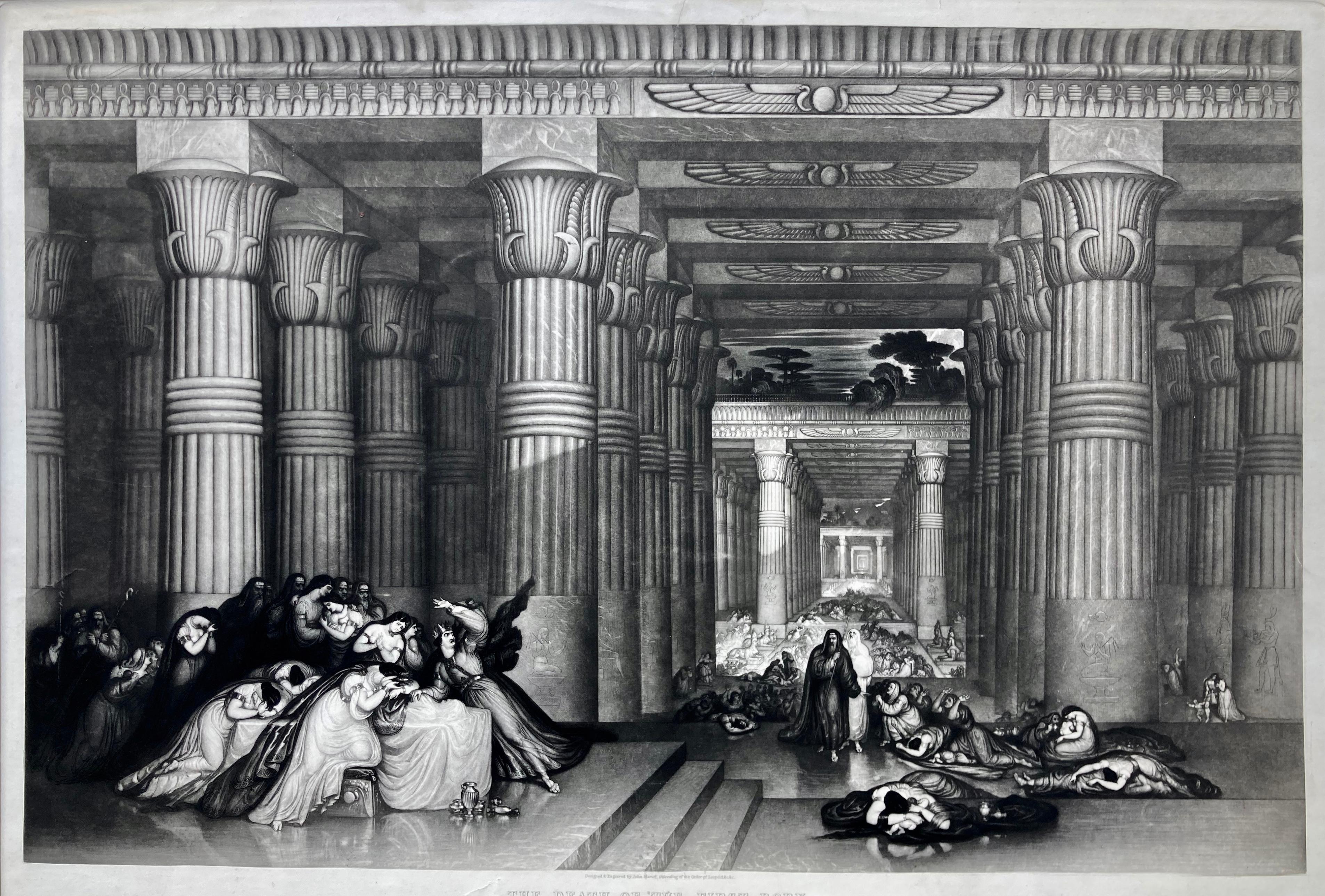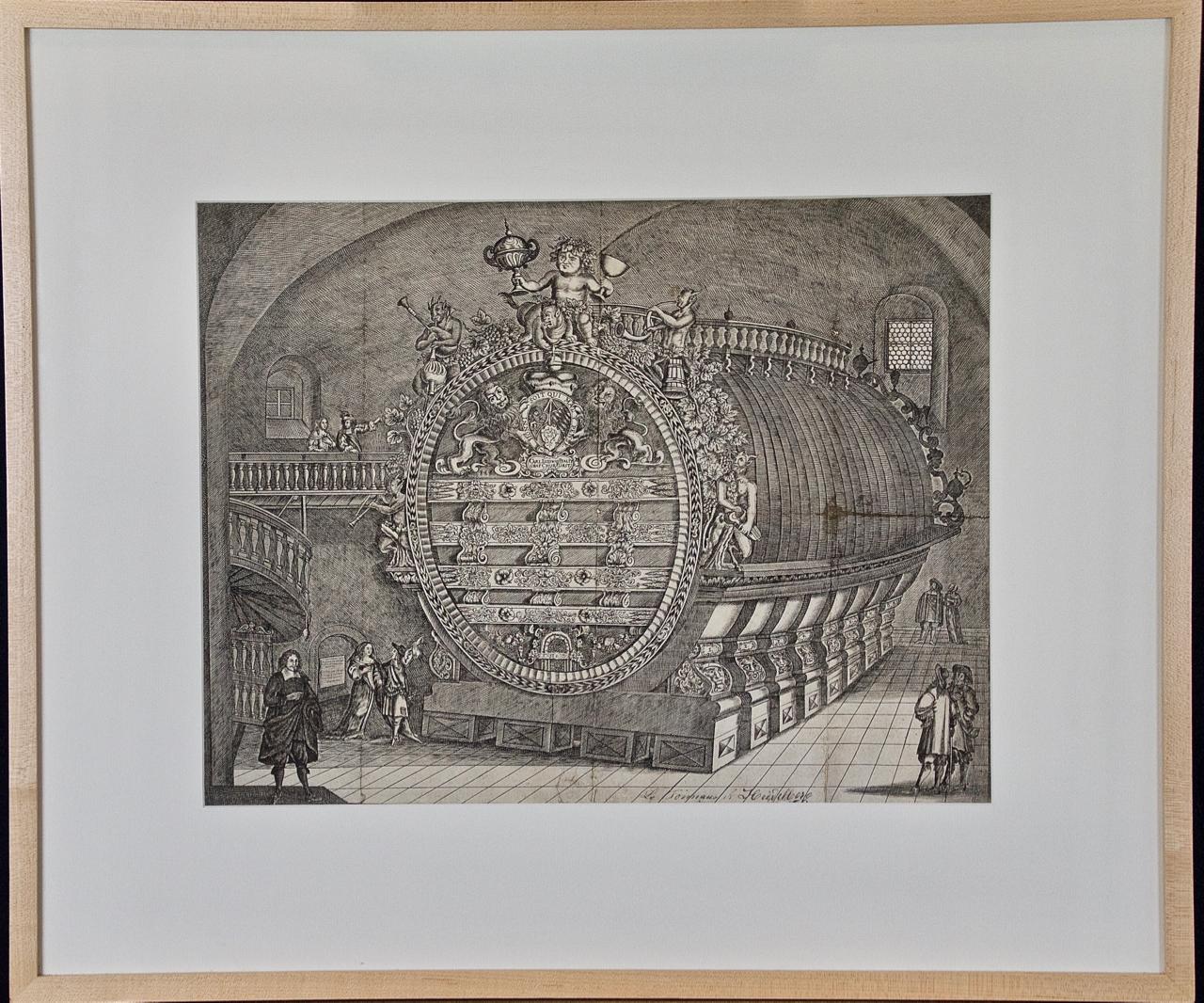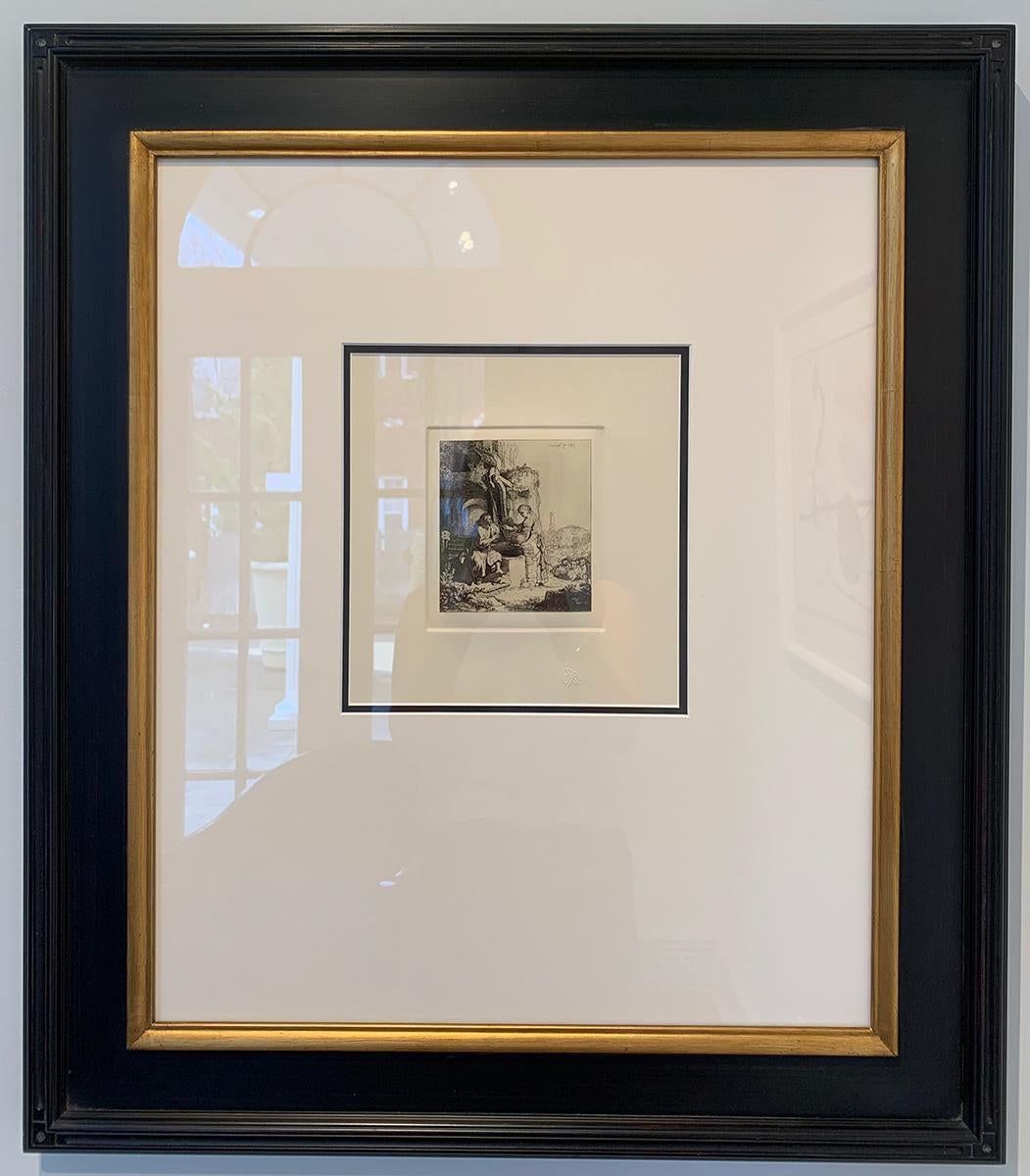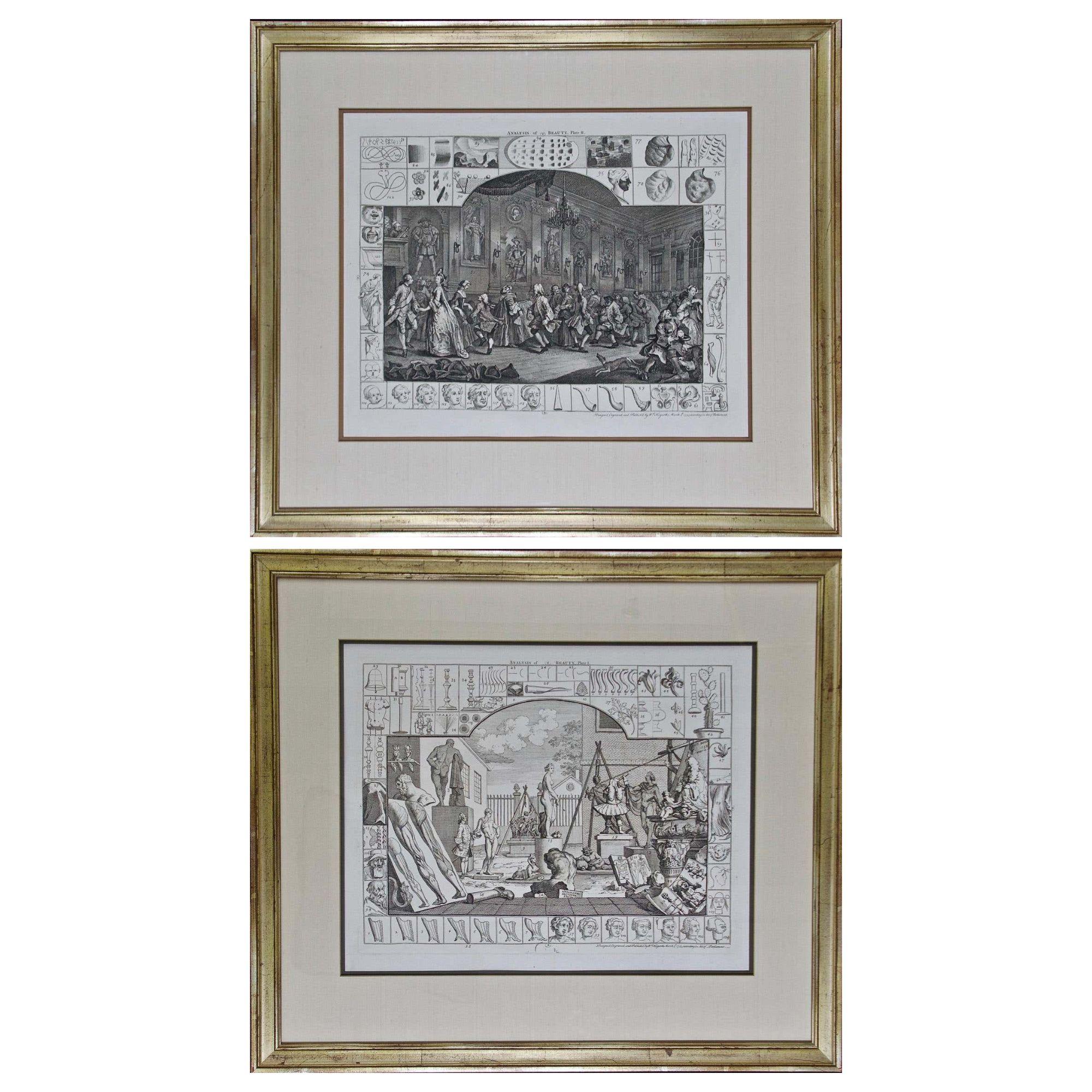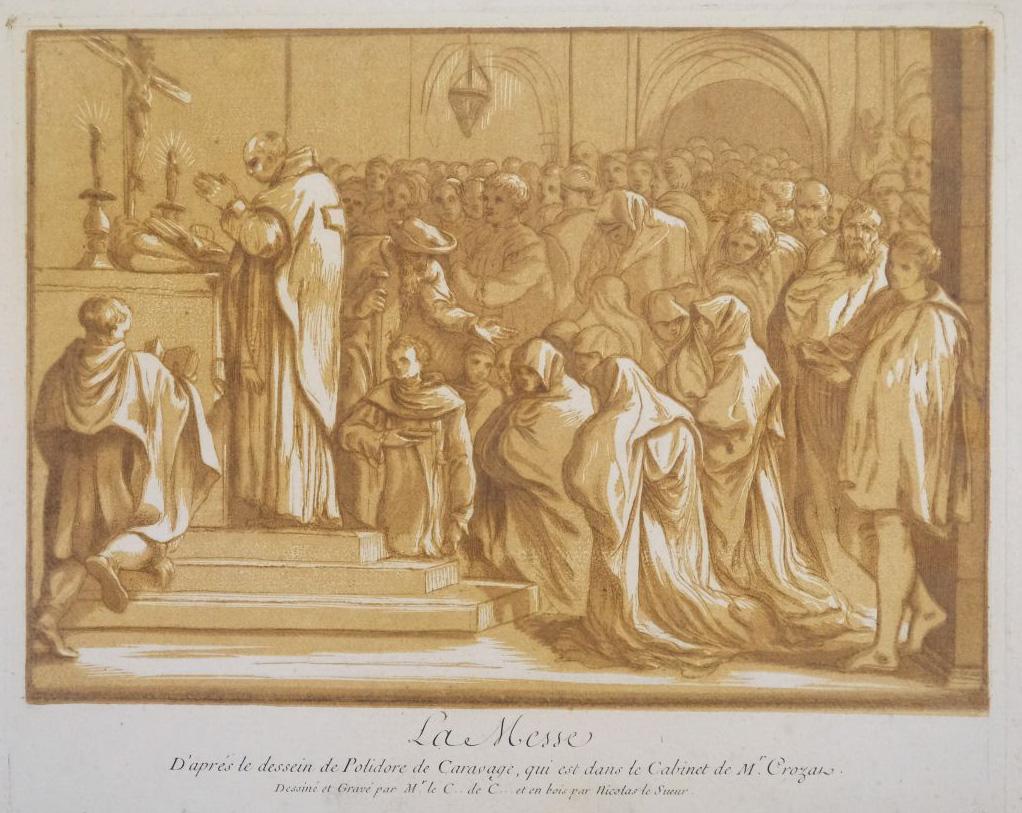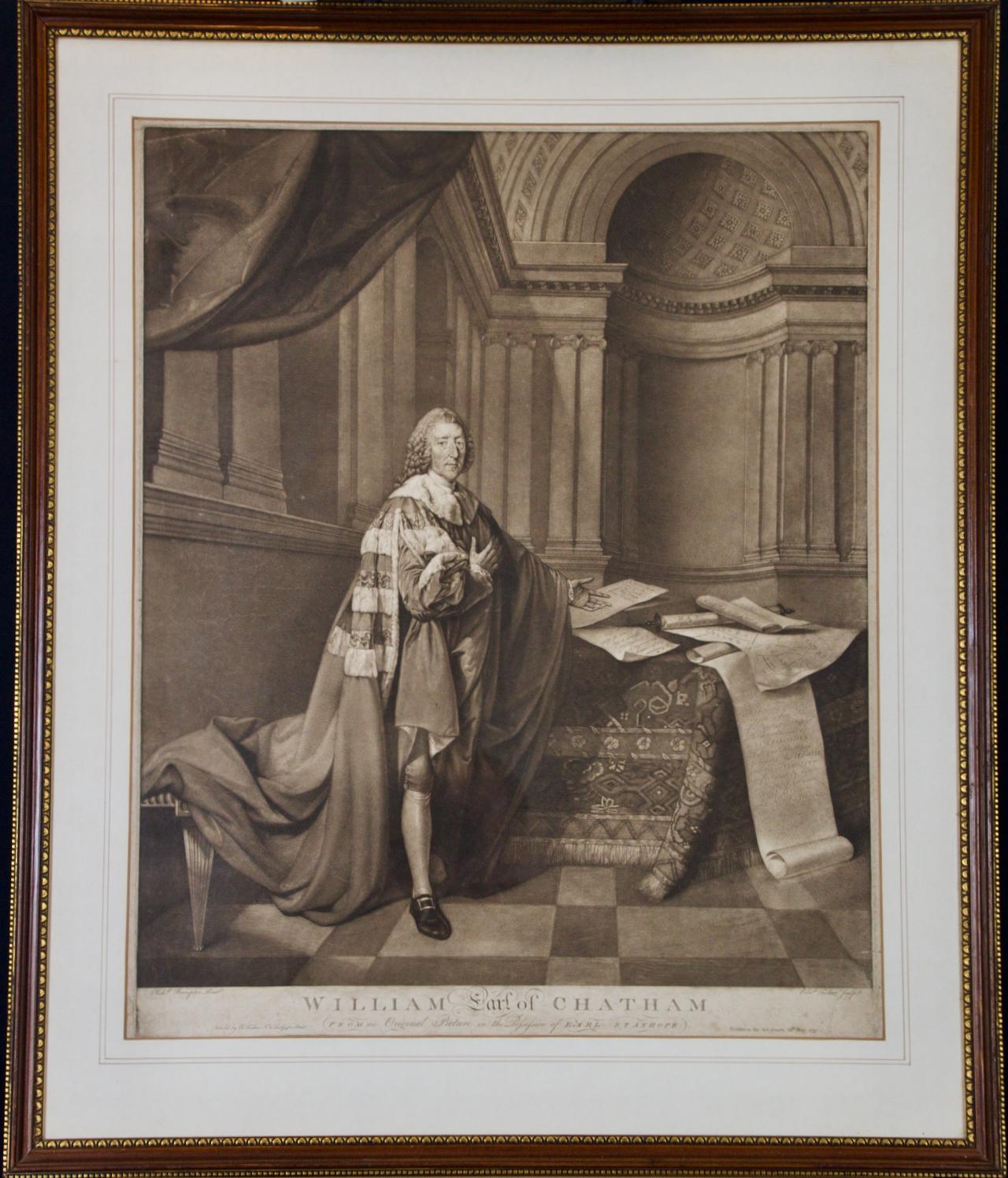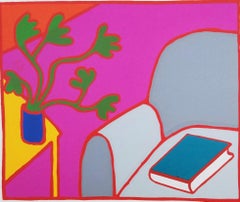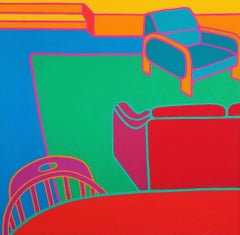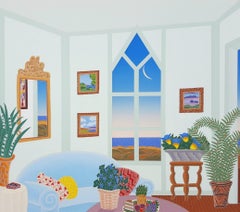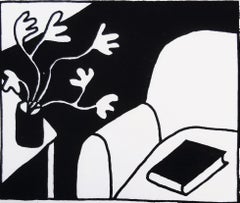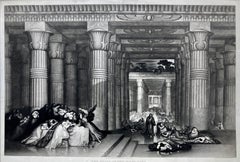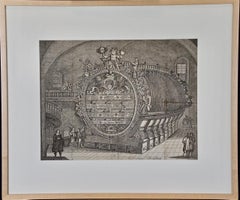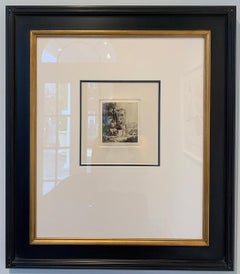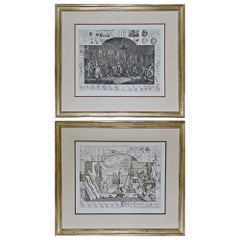Items Similar to St. Alban's Abbey Church, High Altar screen /// Robert Clutterbuck Hertford Art
Want more images or videos?
Request additional images or videos from the seller
1 of 18
Robert ClutterbuckSt. Alban's Abbey Church, High Altar screen /// Robert Clutterbuck Hertford Art1815-1827
1815-1827
About the Item
Artist: Robert Clutterbuck (English, 1772-1831)
Title: "St. Alban's Abbey Church, High Altar screen"
Portfolio: The History and Antiquities of the County of Hertford
Year: 1815-1827 (First edition)
Medium: Original Engraving on wove paper
Limited edition: Unknown
Printer: Nichols, Son, and Bentley, London, UK
Publisher: Nichols, Son, and Bentley, London, UK
Reference: Brunet II, No. 112; Lowndes No. 483; BAL RIBA No. 666; Upcott I, page 623
Sheet size: 17.63" x 11.38"
Image size: 11.57" x 8.57"
Condition: Scattered foxing throughout sheet; it doesn't show much within the image. Creasing to upper left and right corners. Has been professionally stored away for decades. It is otherwise a strong impression in good condition
Notes:
Provenance: private collection - Aspen, CO. Engraved by English artist John Henry Le Keux (1812-1896) after a drawing by English artist Frederick Nash (1782-1856). Comes from Clutterbuck's three volume "The History and Antiquities of the County of Hertford", (1815-1827) (First edition), which consists of 54 engravings. Printed from one copper plate on one color: black. "Vol. I. p. 65" printed upper right in margin. "Proof" printed lower right in margin.
St Albans Cathedral, officially the Cathedral and Abbey Church of St Alban, also known as "the Abbey", is a Church of England cathedral in St Albans, England. Much of its architecture dates from Norman times. It ceased to be an abbey following its dissolution in the 16th century and became a cathedral in 1877.
Biography:
Robert Clutterbuck (28 June 1772 – 25 May 1831) was an English historian. He spent 18 years writing "The History and Antiquities of the County of Hertford". He was the eldest surviving son of Thomas Clutterbuck, of Watford Hertfordshire by Sarah, daughter of Robert Thurgood of Baldock. He was born at Watford on 28 June 1772, and at an early age was sent to Harrow School. He went to Exeter College, Oxford as a gentleman commoner. After graduating B.A. in 1794, he entered Lincoln's Inn, intending to make the law his profession; but became more interested in chemistry and painting (in which he took lessons from James Barry. In 1798, he married Marianne, eldest daughter of Colonel James Capper, and after a few years living at the seat of his father's in-law, Cathays, near Cardiff, Glamorganshire, he took possession of his paternal estate at Watford. He continued to live there until his death, on 25 May 1831. He was a county magistrate and a Fellow of the Society of Antiquaries.
For 18 years, he worked on a new county history; it appeared under the title "The History and Antiquities of the County of Hertford"; compiled from the best-printed authorities and original records preserved in public repositories and private collections. Embellished with views of the most curious monuments of antiquity, and illustrated with a map of the County, 3 vols. London, 1815, 1821, 1827. The plates were in some cases from his own sketches, and he also had the assistance of Edward Blore and other prominent draughtsmen and engravers.
- Creator:Robert Clutterbuck (1772 - 1831, English)
- Creation Year:1815-1827
- Dimensions:Height: 17.63 in (44.79 cm)Width: 11.38 in (28.91 cm)
- Medium:
- Movement & Style:
- Period:
- Condition:
- Gallery Location:Saint Augustine, FL
- Reference Number:1stDibs: LU121214821062
About the Seller
5.0
Platinum Seller
Premium sellers with a 4.7+ rating and 24-hour response times
Established in 1978
1stDibs seller since 2015
1,307 sales on 1stDibs
Typical response time: <1 hour
- ShippingRetrieving quote...Shipping from: Saint Augustine, FL
- Return Policy
Authenticity Guarantee
In the unlikely event there’s an issue with an item’s authenticity, contact us within 1 year for a full refund. DetailsMoney-Back Guarantee
If your item is not as described, is damaged in transit, or does not arrive, contact us within 7 days for a full refund. Details24-Hour Cancellation
You have a 24-hour grace period in which to reconsider your purchase, with no questions asked.Vetted Professional Sellers
Our world-class sellers must adhere to strict standards for service and quality, maintaining the integrity of our listings.Price-Match Guarantee
If you find that a seller listed the same item for a lower price elsewhere, we’ll match it.Trusted Global Delivery
Our best-in-class carrier network provides specialized shipping options worldwide, including custom delivery.More From This Seller
View AllBook on Chair /// Contemporary Pop Art Screenprint Interior Flowers Colorful
By Dan May
Located in Saint Augustine, FL
Artist: Dan May (American, 1955-)
Title: "Book on Chair"
*Signed and numbered by May in pencil lower left
Year: 1989
Medium: Original Screenprint on unbranded white wove paper
Limite...
Category
1980s Contemporary Interior Prints
Materials
Screen
Living Room /// Contemporary Pop Art Screenprint Interior Colorful Chair Sofa
By Dan May
Located in Saint Augustine, FL
Artist: Artist: Dan May (American, 1955-)
Title: "Living Room"
*Signed and numbered by May in pencil lower left
Year: 1981
Medium: Original Screenprint on unbranded white wove paper
...
Category
1980s Contemporary Interior Prints
Materials
Screen
Sagaponack /// Contemporary Thomas McKnight Screenprint Hamptons NY Modern Art
By Thomas McKnight
Located in Saint Augustine, FL
Artist: Thomas McKnight (American, 1941-)
Title: "Sagaponack"
Portfolio: The Hamptons
*Signed by McKnight in pencil lower right
Year: 1987
Medium: Original Screenprint on soft-white Somerset paper
Limited edition: 143/175, (there were also 40 artist's proofs)
Printer: Willco Fine Art, New York, NY
Publisher: Chalk & Vermilion, New York, NY
Sheet size: 21" x 23"
Image size: 16" x 18.13"
Condition: Never framed, has been professionally stored away in its original green silk boxed portfolio for decades. In mint condition
Notes:
Numbered by McKnight in pencil lower left. Comes from McKnight's 1987 "The Hamptons" portfolio of twelve screenprints. Artist's copyright stamp lower right on verso.
Biography:
Thomas McKnight (born 1941) is a U.S. artist. He was born in 1941 in Lawrence, Kansas. He attended Wesleyan University, a small liberal arts college in Middletown, Connecticut, where he was one of only five art majors. He spent his junior year in Paris. After a year of graduate work in art history at Columbia University, in 1964 McKnight found a job at Time Magazine where he would work for eight years, interrupted by a two-year stint in the U. S. Army in South Korea. In 1972 McKnight left Time, summered on the Greek island of Mykonos, and commenced painting in earnest. In 1979 in Mykonos, McKnight met Renate, a vacationing Austrian student, and married the following year. Throughout the 1980s McKnight’s art, mainly limited edition serigraph prints, became increasingly popular. In 1994 he was commissioned by the White House to paint the first of three images for President Clinton...
Category
1980s Contemporary Interior Prints
Materials
Screen
Book on Chair (Black) /// Contemporary Pop Art Screenprint Interior Home Plant
By Dan May
Located in Saint Augustine, FL
Artist: Dan May (American, 1955-)
Title: "Book on Chair (Black)"
*Signed and numbered by May in pencil lower left
Year: 1988
Medium: Original Screenprint on unbranded white wove pape...
Category
1980s Contemporary Interior Prints
Materials
Screen
Sag Harbor /// Contemporary Thomas McKnight Screenprint Hamptons NY Modern Art
By Thomas McKnight
Located in Saint Augustine, FL
Artist: Thomas McKnight (American, 1941-)
Title: "Sag Harbor"
Portfolio: The Hamptons
*Signed by McKnight in pencil lower right
Year: 1987
Medium: Original ...
Category
1980s Contemporary Interior Prints
Materials
Screen
Benevolent Cottagers /// English Landscape Figurative Village Scene Engraving
Located in Saint Augustine, FL
Artist: (after) Sir Augustus Wall Callcott (English, 1779-1844)
Title: "Benevolent Cottagers"
Year: 1816
Medium: Original Etching and Engraving on laid paper
Limited edition: Unknown...
Category
1810s Old Masters Landscape Prints
Materials
Engraving, Etching, Laid Paper, Intaglio
You May Also Like
DEATH OF THE FIRST BORN - Proof - Magnificent Large Scale Mezzotint
By John Martin
Located in Santa Monica, CA
JOHN MARTIN (1789 – 1854)
DEATH OF THE FIRST BORN, Dedicated to His Majesty King Louise Philippe, King of the French, as a Tribute of the Artist’s Grateful...
Category
1830s Old Masters Interior Prints
Materials
Mezzotint
The Heidelberg Tun: A Framed 17th Century Engraving of a Huge Wine Cask
Located in Alamo, CA
"The Heidelberg Tun" is a 17th century engraving by an unknown artist. It depicts a famous huge ornamental wine cask that resided in the wine cellar of Heidelberg Castle. The cask shown here, built in 1664, is the second of four Heidelberg Tuns; the first was destroyed during the Thirty Years' War, between 1618 and 1648. This cask was built in 1664 when Karl Ludwig ordered Heidelberg cellar master...
Category
Late 17th Century Old Masters Interior Prints
Materials
Engraving
'Jesus and the Woman at the Well, ' by Amand-Durand, Engraving
By Armand Durand
Located in Oklahoma City, OK
This early 19th century framed 35" x 31" engraving by artist Amand-Durand depcits an etching of 'Jesus and the Woman at the Well,' after the Dutch master, Rembrandt van Rijn. This poignant Biblical story is depicted by Arman-Durand in Rembrandt style...
Category
Early 19th Century Old Masters Figurative Prints
Materials
Engraving
$1,200 Sale Price
20% Off
Set of Two 18th Century Engravings from William Hogarth's "Analysis of Beauty"
By William Hogarth
Located in Alamo, CA
The two plates in this set were created utilizing both engraving and etching techniques by William Hogarth in 1753, originally as illustrations of his book on aesthetics, entitled "Analysis of Beauty". Due to their popularity, these plates were later published separately. The publication line in the lower right reads: "Designed, Engraved, and Publish'd by Wm. Hogarth, March 5th 1753, according to Act of Parliament." Hogarth's original copper plates were refurbished where needed by James Heath and engravings were republished in London in 1822 by Braddock, Cradock & Joy. This was the last time Hogarth's copper plates were used for printing. Most were melted during World War I for the construction of bombs.
These large folio sized "Analysis of Beauty" engravings are presented in antiqued gold-colored frames with double mats; the outer silk mats are light brown-colored and the inner mats are dark brown. Each frame measures 27.38" x 31.25" x 1.13". There is one tiny spot in the right margin of plate 1 and another in the lower margin; the latter could be from the printing process. The prints are otherwise in excellent condition.
The "Analysis of Beauty" series is in the collection of many major museums, including: The British Museum, The Metropolitan Museum of Art, The Tate Museum, The Chicago Art Institute and The Fine Arts Museums of San Francisco.
The first engraving (Plate 1) depicts a courtyard of statues which is filled with some of the most famous works of classical sculpture. The most important sculptures are surrounded by less impressive works. The Medicean Venus (#13) is in the center with a statue of Julius Caesar (#19) to the right, elevated on a pulley with a short, overdressed Brutus stands over the falling Caesar. The Apollo Belvedere (#12) is next. A judge stands to the right with his foot on a cherub (#16). Another crying cherub holds a gallows and wipes his tears with the judge's robe.
A sphinx (#21) and the drunken Silenus (#107) are below the Venus. Michaelangelo's torso (#54) and a statue of Antonius (#6) are seen in the foreground. The Farnese Hercules (#3) and a bust of another Hercules (#4) under two statuettes of Isis are also included in the scene.
The key to these objects is included in the form of a serpentine line winding around a cone (#26), Hogarth's "Line of Beauty". For Hogarth the winding line is an essential element of beauty in art. Hogarth's theory of beauty is communicated in this plate.
Plate 2 is thought to represent the Wanstead Assembly, with the Earl of Tynley and his household. It is an adaptation of a scene in the Happy Marriage series, which complements Hogarth's Marriage à la Mode...
Category
Mid-18th Century Old Masters Interior Prints
Materials
Etching, Engraving
La Messe (The Mass), after Caravaggio
Located in Middletown, NY
Chiaroscuro woodcut with underlying engraving on cream laid paper, printed from two blocks in brown and olive. 10 1/4 x 12 3/4 inches (260 x 321 mm) (plate), full margins with the text printing clearly below in black ink. In very good condition with scattered surface soiling and several minor flecks of light discoloration in the margins, especially in the area of the lower right corner, well outside of image area. Unobtrusive notations in pencil in the margin and on the verso. All condition issues are consistent with age. After a drawing of the same title by Polidoro da Caravaggio...
Category
Mid-18th Century Old Masters Figurative Prints
Materials
Laid Paper, Engraving, Woodcut
Portrait of William Pitt, Earl of Chatham: Rare Framed Mezzotint after Brompton
By Edward Fisher
Located in Alamo, CA
This is a large framed very rare hand-colored copperplate mezzotint engraved portrait of William Pitt, the Elder, 1st Earl of Chatham by Edward Fisher, published in London in 1779 after a painting by Richard Brompton. Pitt is depicted attired in a flowing regal appearing cape, standing in an ornate room with his left hand outstretched over a serious of manuscripts and scrolls that are laying on a table or desk to his left. The table is covered by a beautiful oriental carpet. The manuscripts include the Magna Carta, a map of the colonies, including Long Island and Staten Island, and papers entitled "A Plan for the Reconciliation between Great Britain and the Colonies", "A Motion Made in 1775 for the Recall of Troops from Boston", "A Provisional Act for Settling the Troubles in America Offered to the House of Lords in 1775", and "It is doing Nothing to repeal a few Scraps of Paper or Pieces of Parchment called Acts of Parliament. But our Business is to repeal the Ill-Will and the Animosity unfortunately now subsisting between Great Britain and North America". This engraving is held by the British Museum and the British Royal Collection Trust.
This large framed mezzotint engraving is presented in a brown wood frame with gold-colored beaded inner and outer trim, and a cream-colored French mat. The frame measures 31.63" high by 26.63" wide by 0.75" deep. There are three short tears along the right edge and mild creasing in the left upper, left lower and right lower corners. It is otherwise in very good condition.
William Pitt (1708-1778) was a member of the British parliament from 1735 to 1761 and prime minister from 1766 to 1768. Pitt was an advocate for the American colonies leading up to the War of Independence. He called for an amiable relationship between Great Britain and the colonies and opposed the Stamp Act and military action in America. He advocated for a withdrawal of English troops from Boston in 1775 and the settling of troubles in America, as two of his manuscripts on the table outline. Pitt's colleague, Lord Shelburne (later the Marquess of Lansdowne) shared his sympathies and after Pitt's death, signed a peace treaty with the United States in 1782.
The American city of Pittsburgh, Pennsylvania is named for William Pitt, the Elder. The name originated when the conflict between the British and French over territorial claims in the Northeast were settled in 1758. General John Forbes and his British army, supported by the American colonial troops, expelled the French from Fort Duquesne (which had been constructed by the French in 1754). Forbes re-named the site for William Pitt the Elder, who at the time was a British statesman. The earliest known reference to the new name, Pittsburgh, is in a letter sent from General John Forbes to Pitt, dated November 27, 1758. Pitt's son, William Pitt, the Younger, like his father, also served as British Prime Minister.
Edward Fisher (1730-1785) was born in Ireland in 1730. He was originally a hatter, but learned engraving in London. He became a member of the Incorporated Society of Artists in 1766, and exhibited there fourteen times between 1761 and 1776. He engraved more than sixty portraits. In addition to this portrait of William Pitt, Earl of Chatham, after Richard Brompton he engraved several portraits after Brompton, including George, Earl of Albemarle, as well as engraved portraits after paintings by Joshua Reynolds, including the Shakespearean actor David Garrick, Hugh, Earl of Northumberland, and Elizabeth, Countess of Northumberland and Laurence Sterne, and Hope Nursing Love, as well as Robert Brown, after Mason Chamberlin, Colley Cibber, after Jean-Baptiste van Loo, Christian VII of Denmark, after Nathaniel Dance, Simon, Earl Harcourt, after Hunter, Roger Long, after Benjamin Wilson...
Category
Late 18th Century Old Masters Portrait Prints
Materials
Mezzotint
